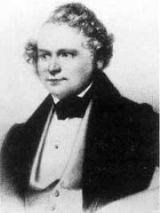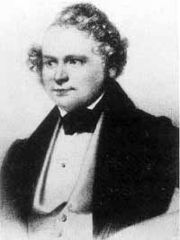
Adolf Glassbrenner
Encyclopedia

Germany
Germany , officially the Federal Republic of Germany , is a federal parliamentary republic in Europe. The country consists of 16 states while the capital and largest city is Berlin. Germany covers an area of 357,021 km2 and has a largely temperate seasonal climate...
humorist and satirist
Satire
Satire is primarily a literary genre or form, although in practice it can also be found in the graphic and performing arts. In satire, vices, follies, abuses, and shortcomings are held up to ridicule, ideally with the intent of shaming individuals, and society itself, into improvement...
, born in Berlin
Berlin
Berlin is the capital city of Germany and is one of the 16 states of Germany. With a population of 3.45 million people, Berlin is Germany's largest city. It is the second most populous city proper and the seventh most populous urban area in the European Union...
.
After working for a short time in a merchant's office, he turned to journalism
Journalism
Journalism is the practice of investigation and reporting of events, issues and trends to a broad audience in a timely fashion. Though there are many variations of journalism, the ideal is to inform the intended audience. Along with covering organizations and institutions such as government and...
, and in 1831 edited Don Quixote, a periodical which was suppressed in 1833 owing to its revolutionary tendencies. He next, under the pseudonym Adolf Brennglas, published a series of pictures of Berlin life, under the titles Berlin wie es ist undtrinkt (thirty parts, with illustrations, 1833–1849), and Buntes Berlin (fourteen parts, with illustrations, Berlin, 1837–1858), and thus became the founder of a popular satirical literature associated with modern Berlin. In 1840 he married the actress Adele Peroni (1813–1895), and removed in the following year to Neustrelitz
Neustrelitz
Neustrelitz is a town in the Mecklenburgische Seenplatte district in the state of Mecklenburg-Vorpommern, Germany. It is situated on the shore of the Zierker See in the Mecklenburg Lake District. From 1738 until 1918 it was the capital of the duchy of Mecklenburg-Strelitz...
, where his wife had obtained an engagement at the Grand Ducal theatre. In 1848 Glassbrenner entered the political arena and became the leader of the democratic party in Mecklenburg-Strelitz
Mecklenburg-Strelitz
Mecklenburg-Strelitz was a duchy and later grand duchy in northern Germany, consisting of the eastern fifth of the historic Mecklenburg region, roughly corresponding with the present-day Mecklenburg-Strelitz district , and the western exclave of the former Bishopric of Ratzeburg in modern...
. Expelled from that country in 1850, he settled in Hamburg
Hamburg
-History:The first historic name for the city was, according to Claudius Ptolemy's reports, Treva.But the city takes its modern name, Hamburg, from the first permanent building on the site, a castle whose construction was ordered by the Emperor Charlemagne in AD 808...
, where he remained until 1858; and then he became editor of the Montagszeitung Berlin, where he died in 1876. His grave is preserved in the Protestant Friedhof III der Jerusalems- und Neuen Kirchengemeinde (Cemetery No. III of the congregations of Jerusalem's Church
Jerusalem's Church
Jerusalem's Church is one of the churches of the Evangelical Congregation in the Friedrichstadt , a member of the Protestant umbrella organisation Evangelical Church of Berlin-Brandenburg-Silesian Upper Lusatia. The present church building is located in Berlin, borough Friedrichshain-Kreuzberg, in...
and New Church
Deutscher Dom
Deutscher Dom is the colloquial naming for the New Church located in Berlin on the Gendarmenmarkt across from Französischer Dom . Its parish comprised the northern part of the then new quarter of Friedrichstadt, which until then belonged to the parish of the congregations of Jerusalem's Church...
) in Berlin-Kreuzberg
Kreuzberg
Kreuzberg, a part of the combined Friedrichshain-Kreuzberg borough located south of Mitte since 2001, is one of the best-known areas of Berlin...
, south of Hallesches Tor
Hallesches Tor (Berlin U-Bahn)
The underground station Hallesches Tor is part of the Berlin U-Bahn network at the intersection of the east-west bound U1 and the north-south bound U6 in the Kreuzberg district.-Overview:...
.
Among Glassbrenner's other humorous and satirical writings may be mentioned:
- Leben und Treiben der feinen Welt (1834)
- Bilder und Träume aus Wien (2 vols., 1836)
- Gedichte (1851, 5th ed. 1870)
- Neuer Reineke Fuchs (1846, 4th ed. 1870)
- Die verkehrte Welt (1857, 6th ed. 1873)
- Kaspar der Mensch (1850)
- Berliner Volksleben (3 vols., illustrated; Leipzig, 1847-1851)
- Lachende Kinder (14th ed., 1884)
- Sprechende Tiere (20th ed., Hamburg, 1899).

